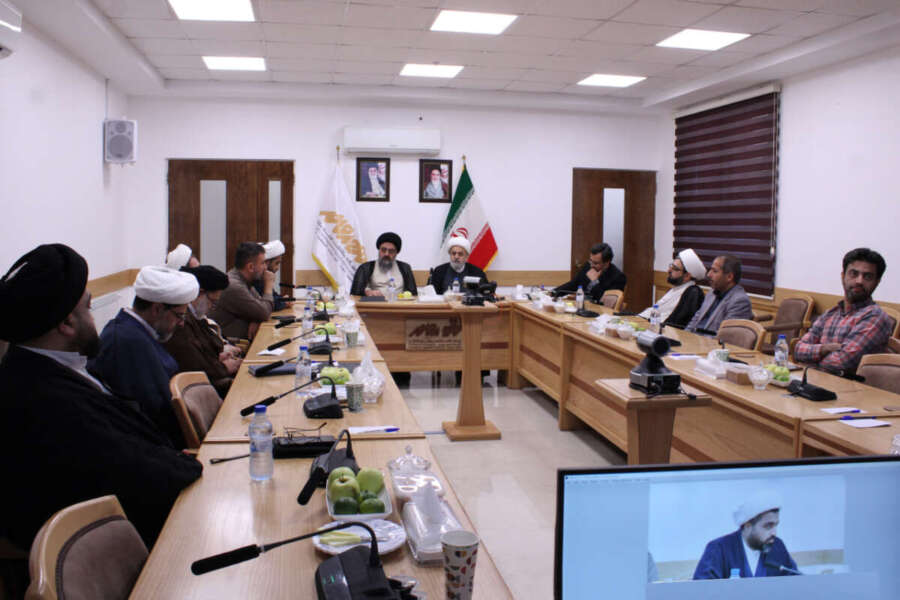Note: The Research Institute for Contemporary Jurisprudential Studies, which began its activities in 2020, operates with 13 research groups and over 50 active research projects. It focuses on emerging jurisprudential fields such as environmental jurisprudence, political jurisprudence, and women’s jurisprudence, aiming to address scientific gaps. Dr. Shahriari commended the institute’s progress, describing contemporary jurisprudence as a sensitive field requiring patience and institution-building. He highlighted the necessity of leveraging artificial intelligence and modern technologies to accelerate research processes.
According to the news portal of the Research Institute for Contemporary Jurisprudential Studies, on Thursday, October 2, 2025, Hujjat al-Islam wal-Muslimeen Dr. Hamid Shahriari, President of the SAMT Organization and Secretary-General of the World Forum for Proximity of Islamic Schools of Thought, visited the institute to review its activities and programs.
At the beginning of the meeting, Hujjat al-Islam wal-Muslimeen Dorri, Deputy Director of the institute, congratulated the attendees on the auspicious birth anniversary of Imam Hassan Askari (AS). He stated: “The Research Institute for Contemporary Jurisprudential Studies, established in 2020, currently has 13 active research groups in various fields, including environmental jurisprudence, political jurisprudence, and women’s jurisprudence. Over 50 research projects are either in the process of being published or completed, and more than 225 scientific sessions have been held to date.”
The Deputy Director highlighted the institute’s extensive activities in various domains, adding: “The institute has undertaken initiatives such as publishing 26 electronic scientific journals, launching the Contemporary Jurisprudence Courses website with over 11,000 educational resources, and compiling the Contemporary Jurisprudence Encyclopedia with more than 600 entries. The primary goal of the institute is to foster collaboration and synergy with organizations like SAMT to advance contemporary jurisprudence.”
Next, Hujjat al-Islam wal-Muslimeen Haqqani Fazl, Director of the Contemporary Jurisprudence Encyclopedia, presented an overview of the encyclopedia’s activities, stating: “The Contemporary Jurisprudence Encyclopedia began its work in 2020 and has so far compiled over 600 scientific entries on various topics. The encyclopedia includes introductions to scholarly figures, analyses of books, articles, and reports on the state of research in emerging jurisprudential fields. Despite significant efforts and progress, some areas still face a shortage of research resources, necessitating further studies.”
Following this, Ayatollah Noormofidi, President of the Research Institute for Contemporary Jurisprudential Studies, welcomed Dr. Shahriari and expressed gratitude for his visit. He stated: “This institute, established less than five years ago, has focused on contemporary jurisprudence, striving to identify scientific gaps and organize research that addresses the needs of the academic community in emerging jurisprudential fields.”
The professor of advanced jurisprudential studies at the Islamic Seminary further noted: “One of our key steps has been to consolidate and organize scattered resources and facilitate researchers’ access to information, which undoubtedly lays the groundwork for future progress.”
Ayatollah Noormofidi, referring to the progress of research projects, stated: “Approximately 100 projects have been submitted to the institute, of which about 30 have been completed, with the rest in various stages of progress. This process is slow, but we hope to take more effective steps through increased collaboration.”
The President of the Research Institute concluded: “We have sought to address the gaps and shortcomings in contemporary jurisprudence by leveraging past experiences and avoiding incorrect approaches. The institute is ready to collaborate with organizations like SAMT to better fulfill our scientific missions.”
In the continuation of the meeting, Hujjat al-Islam wal-Muslimeen Dr. Hamid Shahriari, President of the SAMT Organization, emphasized the necessity of engaging with contemporary jurisprudence, stating: “Contemporary jurisprudence is a sensitive field that requires patience and institution-building. Engaging in this field is a challenging task that demands time and sustained effort. Unlike traditional perspectives, contemporary jurisprudence examines emerging issues, making their precise identification essential to determine their jurisprudential nature.”
The President of SAMT described the establishment of the Research Institute for Contemporary Jurisprudential Studies as a significant and promising step in advancing this field, noting: “This institute plays a key role in organizing and developing modern jurisprudential research, and scientific collaboration, particularly with SAMT, is vital for progress in this discipline.”
Dr. Shahriari stressed the importance of collaboration between scientific institutions and specialized research centers, adding: “Recognizing the need for innovation, SAMT has initiated approximately 10 technology-driven projects in the humanities over the past six months and is ready to publish and distribute the institute’s works as university textbooks.”
He also highlighted the application of artificial intelligence in jurisprudential research, proposing the formation of a group to utilize this technology for analysis, summarization, and management of the institute’s resources. This, he noted, could accelerate the research process and enhance its quality. He described this as a golden opportunity to transform the direction of research and foster innovation in the humanities and jurisprudence, adding that those who advance this path will hold a distinguished position in the future.

